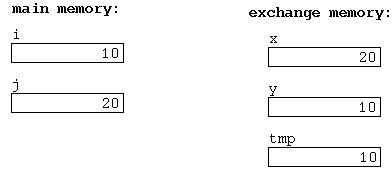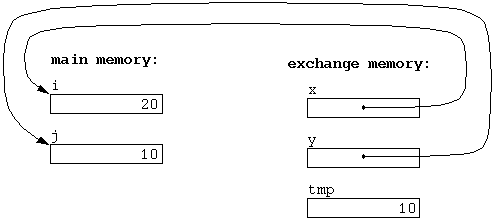-
The index to the
program 4
directory has links to several files related to testing your blackjack program.
- We'll go over those testing resources in class.
-
The primary use of function parameters is to provide input to the function; we
have seen many examples of this in lectures so far.
-
In the
Week 6 notes,
we saw how arrays can be use as function output parameters, in addition to
being used for input.
-
This week, we'll see how pointers can be used for function output
parameters of any type.
- We'll also see how to supply parameters to the main function of a C program.
-
We have seen a variety of different kinds of functions so far in 101.
-
All functions follow the same steps when they're called.
-
The steps are:
-
evaluate the actual parameters -- the actual
parameters are the values and expression the function is called with
-
assign actual parameter values to the corresponding formal
parameters -- the formal parameters are the names of the
parameters the function is defined with
-
run the function body -- the function body
is the C code between the opening and closing curly braces of the function
definition
- return from the function -- the return from a function is done by zero or more return statements in the function body; in the case of void functions, no explicit return is necessary, since the function returns when control reaches the closing curly brace of its definition
-
evaluate the actual parameters -- the actual
parameters are the values and expression the function is called with
-
Suppose we want to write a function named exchange that can exchange
the value of two integer variables.
-
The intended effect of the function goes like this:
-
Declare two integer variables outside of the exchange function.
-
Assign the variables some values.
-
Call the exchange function with the two variables.
- When the function returns, the variable values have been swapped.
-
Declare two integer variables outside of the exchange function.
-
Here's an attempt at defining exchange, in a C program file named
exchange-naive.c:
#include <string.h> #include <stdio.h> /**** * * Implementation and testing a C function that wants to exchange the value of * two integer variables. Unfortunately, this function does not work as * intended. See the file exchange.c for a version that does work. * */ void exchange(int x, int y) { int tmp; /* Hold the value of x temporarily */ tmp = x; x = y; y = tmp; } int main() { int i = 10; int j = 20; printf("i,j before exchange = %d,%d\n", i, j); exchange(i, j); printf("i,j after exchange = %d,%d\n", i, j); return 0; } -
When this program runs, the before and after values i and j
are unchanged, i.e., the program outputs 10 and 20 in both of
the printf statements.
-
This is not the intent of the program, alas.
-
What we want the program to output in the second printf is 20
and 10.
- So what's going on?
-
This is not the intent of the program, alas.
-
The answer can be had with a step-by-step trace of what happens when the
exchange function is called:
-
evaluate the actual parameters -- these are
10 and 20, respectively
-
assign the actual values to the corresponding formal
parameters -- this results in the values of 10 and 20 being
assigned to the parameters x and y
-
run the function body -- this results in the values
of x and y being exchanged; BUT NOTE CAREFULLY HERE: the
exchange of x and y has no effect at all on i and
j in main, since x and y are in totally
separate memory locations from i and j
- return from the function -- since the function has a void return, it does not send back any value; and again, the changes that were made locally to x and y are not output in any way back to main
-
evaluate the actual parameters -- these are
10 and 20, respectively
-
Figure 1 is a picture of what memory looks like just before exchange
returns.

Figure 1: Main and exchange memory just before exchange returns; changing x and y had no effect on i and j.
-
To get the exchange function to work, we need to use formal output
parameters, as discussed in Section 6.4 of the book.
-
The idea is to declare a formal parameter to be a pointer.
-
Here is a working version of the exchange function, in a program file
named
exchange.c
:
#include <string.h> #include <stdio.h> /**** * * Implementation and testing a C function that exchanges the value of two * integer variables. It illustrates the concept of formal output parameters, * covered in Section 6.4 of the book. * */ void exchange(int *x, int *y) { int tmp; /* Hold the value of x temporarily */ tmp = *x; *x = *y; *y = tmp; } int main() { int i = 10; int j = 20; printf("i,j before exchange = %d,%d\n", i, j); exchange(&i, &j); printf("i,j after exchange = %d,%d\n", i, j); return 0; } -
For this version of the exchange program, calling the exchange
function goes like this:
-
evaluate the actual parameters -- these are a
pointer to the variable x and a pointer to the variable y,
respectively; note the use of the '&' operator in the actual
parameters; '&' returns a pointer to (aka, address of) the
variable it operates on
-
assign the actual values to the corresponding formal
parameters -- this results in the pointer values being assigned
to the parameters x and y
-
run the function body -- this results in the values
of variables pointed to by x and y being exchanged; AND NOTE
CAREFULLY HERE: the exchange of x and y does affect
i and j in main, since x and y are
pointers to i and j, and using the '*' operator in
the body of exchange means that the change happens on what x
and y point to, not on the values of x and y
themselves
- return from the function -- since the function has a void return, it does not send back any value; however, since the changes through the formal output parameters did effect i and j in main, this means that the effect of executing exchange has produced a change in, i.e., and output to, the variables in main.
-
evaluate the actual parameters -- these are a
pointer to the variable x and a pointer to the variable y,
respectively; note the use of the '&' operator in the actual
parameters; '&' returns a pointer to (aka, address of) the
variable it operates on
-
Figure 2 is a picture of what memory looks like just before the pointer-based
version of exchange returns.

Figure 2: Main and exchange memory just before exchange returns.
-
Section 13.7 on Page 688 of the book discusses this subject.
-
This topic is also covered in CSC 101
Lab 7
.
-
Here is the simple example from the Lab 7 page, that reads numeric command-line
arguments and converts them from strings to ints.
#include <stdio.h> #include <stdlib.h> /**** * * Read command-line arguments and convert them to ints. Invoke this program * from the terminal like this, for example: * * cmd-line 10 20 30 * * assuming that the program has been compiled with "gcc ... -o cmd-line". The * output with this invocation is this: * * arg[1] = 10 * arg[2] = 20 * arg[3] = 30 * */ int main(int argc, char** argv) { int i; int val; char* arg; for (i = 1; i < argc; i++) { arg = argv[i]; val = atoi(arg); printf("arg[%d] = %d\n", i, val); } return 0; } - We'll discuss this during lecture.